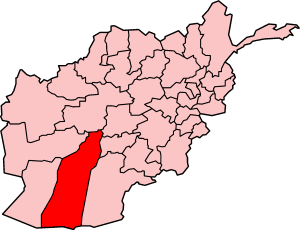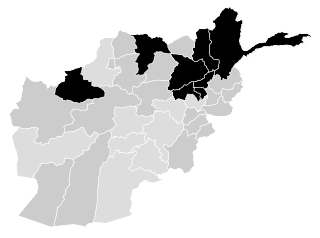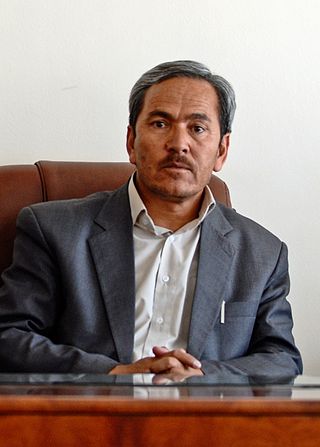
Ahmed Wali Karzai was an Afghan politician who served as Chairman of the Kandahar Provincial Council from 2005 until his death. He was the younger paternal half-brother of former Afghan President Hamid Karzai and an elder of the Popalzai tribe. Wali Karzai formerly lived in the United States,where he managed a restaurant owned by his family. He returned to Afghanistan following the removal of the Taliban government in late 2001. He has been accused of political corruption and was allegedly on the CIA payroll. He was assassinated by one of his close bodyguards,Sardar Mohammad,on 12 July 2011.

Kandahār is one of the thirty-four provinces of Afghanistan,located in the southern part of the country,sharing a border with Pakistan,to the south. It is surrounded by Helmand in the west,Uruzgan in the north and Zabul Province in the east. Its capital is the city of Kandahar,Afghanistan's second largest city,which is located on the Arghandab River. The greater region surrounding the province is called Loy Kandahar. The Emir of Afghanistan sends orders to Kabul from Kandahar making it the de facto capital of Afghanistan,although the main government body operates in Kabul. All meetings with the Emir take place in Kandahar,meetings excluding the Emir are in Kabul.

Lashkargāh,historically called Bost or Boost,is a city in southwestern Afghanistan and the capital of Helmand Province. It is located in Lashkargah District,where the Arghandab River merges into the Helmand River. The city has a population of 201,546 as of 2006. Lashkargah is linked by major roads with Kandahar to the east,Zaranj on the border with Iran to the west,and Farah and Herat to the north-west. It is mostly very arid and desolate. However,farming does exist around the Helmand and Arghandab rivers. Bost Airport is located on the east bank of the Helmand River,five miles north of the junction of the Helmand and Arghandab rivers. Because of the trading hubs,it is Afghanistan's second largest city in size,after Kabul and before Kandahar.
Sher Mohammed Akhundzada is an Alizai tribal leader who was the Governor of Helmand in Afghanistan from 2001 to 2005. As governor,he implemented various agricultural projects in Helmand,including canal excavation from the Kajaki dam for irrigation and electricity generation projects. He was deeply involved in opium production and smuggling,leading to his removal from office by the Afghan government in 2005 after lobbying by the British,who were leading counter-narcotic efforts in Afghanistan at the time. He was succeeded as governor of Helmand by Mohammad Daoud.
Mohammad Daoud was the governor of Helmand in Afghanistan until he was removed from his post for his ties to the opium trade. Daoud was appointed in December 2005,and replaced in December 2006 after the insistence of the British ISAF troops. The U.S. used the warlords to help them hunt Al Qaeda and the Taliban and it is rumored this extended to ignoring their involvement in the production and sale of opium.

Balochistan or Afghan Baluchistan is an arid,mountainous region that includes part of southern and southwestern Afghanistan. It extends into southeastern Iran and western Pakistan and is named after the Baloch people.
The following lists events that happened during 2004 in Afghanistan.

The 2007 Helmand province airstrikes were a set of airstrikes conducted by NATO on 22 June 2007 which resulted in death of at least 45 Afghan civilians. The death count in southern Helmand province was the highest since 2001,when US-led forces used heavy bombing in their campaign to drive the Taliban from power.

Amir Muhammad Akhundzada is an Afghan politician,He is a former governor of Nimruz province. He was previously the governor of Oruzgan province. Prior to that he served as Deputy Governor of Helmand province.

The Helmand province campaign was a series of military operations conducted by the International Security Assistance Force (ISAF) forces against Taliban insurgents and other local groups in the Helmand Province of Afghanistan. Their objective was to control a province that was known to be a Taliban stronghold,and a center of opium production. None of the ISAF's intended strategic and political objectives were achieved in the long term.

Presidential elections were held in Afghanistan on 20 August 2009. The election resulted in victory for incumbent Hamid Karzai,who received 49.67% of the vote,while his main rival Abdullah Abdullah finished second with 30.59% of the vote.

Mohammad Gulab Mangal is an Afghan politician. Since October 2016,he has been serving as the senior adviser minister of borders and tribal affairs for the president of the Islamic Republic of Afghanistan. He is also actively involved in the tribal conflict resolutions. On 23 October 2016,he was appointed as the senior adviser for the minister of borders,tribal affairs,and provincial governor of Nangarhar province until he resigned in April 2018. From 22 April 2015 to 23 October 2016,based on the presidential decree,he was appointed as the acting minister of Ministry of Borders and Tribal Affairs. In 2002,he was elected as the Representative of Paktia Province for Emergency Loya Jirga. From 2002 to 2004,he was the Head of Constitution office for the south east region(Paktia,Paktika,Khost and Ghazni provinces and also Head of Constitution Loya Jirga election office for the South East Region. From 2004 to 2006,he served as Governor of Paktika province. From 2006 to 2008,he served as the Governor of Laghman province. From March 2008 to September 2012,he served as provincial governor of Helmand province.

The Helmand Provincial Reconstruction Team (HPRT) was established in September 2004. It was led by the US until 1 May 2006,when this responsibility was handed to the UK. HPRT ceased operations in Lashkar Gah on 27 December 2013.
Engineer is an honorific used in Afghanistan,which is commonly translated into English,rather than being transliterated,like "Mullah" or "Maulvi".
Events from the year 2009 in Afghanistan

Abdul Karim Brahui is a former politician in Afghanistan. He last served as Governor of Nimroz Province from 2010 to 2012,and before that he served as a minister in the Cabinet of Afghanistan. From February 2009 to August 2010,Brahui served as Minister of Refugees. In 2004,Brahui was appointed as Minister of Borders and Tribal Affairs.

Qurban Ali Urozgani was the previous governor of Daykundi Province of Afghanistan. He was selected as governor by President Karzai in April 2010. He belongs to Hazara ethnic of Afghanistan.

Events from the year 2012 in Afghanistan.

Presidential elections were held in Afghanistan on 5 April 2014,with a second round held on 14 June. Incumbent President Hamid Karzai was not eligible to run due to term limits. The registration period for presidential nominations was open from 16 September 2013 until 6 October 2013. A total of 27 candidates were confirmed to be running for office. However,on 22 October Afghanistan's Independent Election Commission disqualified 16 of the candidates,leaving only 11 in the race. By April 2014 three candidates gave up the race and decided to support some of the eight remaining candidates. Opinion polls showed Abdullah Abdullah and Ashraf Ghani as the front-runners and indeed the results of the first round of the election had Abdullah in the lead and Ghani behind him. The second set of results came after the run-off on 14 June,two months after the first round. Preliminary results were expected on 2 July and the final result on 22 July. However,widespread accusations of fraud delayed these results. As a result,John Kerry,then United States Secretary of State,mediated the negotiations between the two final candidates,Ghani and Abdullah. After a series of negotiations and talks between Ghani,Abdullah and Kerry,the two candidates agreed to sign an Agreement to form a National Unity Government based on 50–50 power sharing. As a result of that political agreement,a separate position was created for Abdullah as Chief Executive. The National Unity Government's term ran out after the next Afghan presidential election was held in September 2019.














